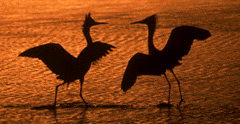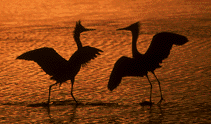FOUR WIMBERLEY HEADS ($571.50 INCLUDES SHIPPING)
AND 100 DOUBLE BUBBLES NOW IN STOCK.
COMING SOON: 2001 BEAUTIFUL BIRDS CALENDARS
ANNOUNCING, IN RESPONSE TO POPULAR DEMAND:
ANOTHER SOUTHERN CALIFORNIA INSTRUCTIONAL PHOTO-TOUR
JAN 18-21, 2001, $1199 4-DAY (LIMIT 6)
Brown Pelicans (endangered CA race in breeding plumage with bright red
bill
pouches), gulls--including spectacular Heerman's) , shorebirds, ducks,
grebes, loons & more. Wood Duck, Redhead, Ring-Necked Duck, and Golden
Eagle
are strong possibilities. Destinations include San Diego, La Jolla, Bolsa
Chica Lagoon, and Newport Back Bay.
An illustrated web article: Tips for Using a Wimberley Head by Arthur
Morris
Visit: Wildlight.com at
http://www.wildlight.com/columns/birds_as_art/2000/08/20
THE CANON 500D 2-ELEMENT DIOPTER/TECHNICAL COMMENTS FROM BRYAN GEYER OF
REALLY RIGHT STUFF:
The 500 in 500D is the focal length of the diopter in mm. To find the
power
of the diopter, divide one meter by the focal length of the diopter, that
is
divide one meter by 1/2 meter (500mm). 1 divided by 1/2 = 2. The 500D is
therefore, a two power diopter. By definition (as above), the 500D will
focus the lens at infinity at 500mm from the film plane. To calculate the
magnification at infinity when used on a 400mm focal length lens, divide
the
focal length of the lens by the focal length of the diopter. 400mm/500mm
This setup will produce images at 8/10th life-size, not quite 1:1.
As
you focus at closer than infinity, the magnification will increase. When
used with extension tubes it is easy to achieve greater than life-size
(1:1)
magnification.
Remember, if you wish to work with a variety of magnifications, diopters
are
best used on ZOOM LENSES. I just love the 500D on the Canon 100-400mm L
IS
zoom. See the archived Bulletins on the web site for more INFO on using
this set-up for macro-photography.
The two attached flower images from the Pribilofs Trip (Whiteny Lake) were
made with the 100-400 mm IS zoom lens with the 500 D diopter and fill
flash
at -2/3 stop.
Venting: I received an e-mail from a more-than-competent
photographer-friend
that--in reference to the featured portfolio of my work that appears in
the
current issue of Outdoor Photographer--contained the following question:
How do I get someone to write something like that about me?
Here is my response:
"It's easy. Just execute the following steps:
1-Despite the advice of friends and loved ones, quit your well paying day
job with unparalleled benefits and an amazing pension to pursue a dream.
2-Bust your ass for 18 years trying to make artistic images of birds that
please you.
3-Bust your ass for 18 years marketing those images.
4-Work all mornings, afternoons, weekends and vacations while teaching
for
the first ten years of your photography career, spending many thousands
of
dollars more each year than you take in.
5-After you "retire" to be a professional photographer, work 14+ hours
per
day.
6-Write four books. Do six TV programs and a worldwide TV commercial for
Canon. Become skilled at self-promotion and work tirelessly at it.
7-Teach more than a dozen Instructional-Photo Tours annually, routinely
driving yourself to exhaustion (and often getting sick as a result) to
ensure that all of the participants have a great time with many wonderful
photo opportunities.
8-Be smart enough to hire your older daughter who manages the business
superbly and makes all submissions so that you can be away from home more
and make more wonderful images.
9-Bother the folks at OP relentlessly for seven years with various story
ideas (and have your work appear there on only a limited basis).
I probably left our more steps than I included, but I need to get back to
work....."
Best and cya,
AM"
FURTHER COMMENTS ON THE CANON EOS 1v CAMERA BODY
It is my recommendation that EOS 1v users NOT use Automatic Focusing
Point
Selection AF mode for photographing birds in flight. On my upcoming New
York/New Jersey trip I will test the 1v for flight photography using the
central sensor only. I had hoped that AFPS would perform better than it
did
for flight photography on St. Paul where we had spectacular chances with
flying Northern Fulmars. While I did make many sharp images, there were
many soft images as well. And though conditions were difficult, we were
largely making"top shots" as the birds were hanging just below our
position
high on Southwest Cliffs. It is my strong belief that the unsharp images
WERE a result of improper focus and NOT a result of the relatively slow
shutter speeds (1/250 sec.) that were used.
To read my initial review of the 1v, see, in the archived Bulletins on the
web site: Bulletin #21, May 20, 2000:
An Evaluation Of The Canon Eos 1v Camera Body.
THE ROD PLANCK INVISIBLIND is available from Rod Planck for $139.00. This
is the bag-type blind that I use. It is the only bag blind that I know of
that is great for tall folks. E-mail: rplanck@up.net for additional INFO.
As I will be heading up to New York tomorrow for a five week
teaching/photography trip and my DELL laptop continues to give me great
heartache--they have promised to send me a brand new one in exchange for
my
lemon, I will not have e-mail access for at least two weeks. I will not,
therefore, be able to answer on-line questions for quite some time.
Best and great picture making to all.
Arthur Morris/BIRDS AS ART


